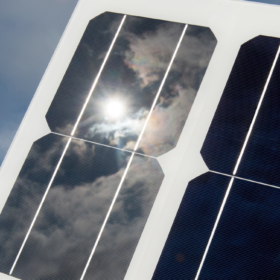
Scientists in Spain have tested various properties of anti-reflective and anti-soiling coatings for PV module glass, aiming to develop a material that offers the best balance of desired material properties at the lowest cost. Over a year of testing, the best coatings were shown to boost module output by around 2%, and the group also made several observations that could influence future developments of coatings for PV module front glass.
With proven ability to increase energy yield, anti-reflective coatings (ARCs) have firmly established themselves in PV manufacturing. The vast majority of module manufacturers now employ an ARC on the frontside glass of their products, and demand is developing for ‘aftermarket’ coatings to be applied on modules already in the field.
Beyond allowing more light through the glass and onto the active cell though, front glass coatings with the right properties can also help to reduce soiling – both increasing performance and reducing maintenance costs.
Coatings combining both properties have been introduced to market in the past couple of years, however challenges remain for producers to keep up with rapidly falling costs elsewhere in the PV module supply chain, and also to engineer coatings that can match the increasing lifetime guarantees manufacturers now need to offer. As the first line of defense between a module’s inner workings and the ambient environment, such coatings must offer excellent durability, including standing up to harsh cleaning solutions, for 30 years or even more in the field.
New solutions
Scientists led by Bilbao headquartered research institute Tecnalia investigated a range of different silica-based AR coating materials, as well as stacked-layer compositions, and different methods to deposit these onto the glass.
Testing a total of seven different configurations over a one-year period, the group found that porous methyl-silylated silica, prepared using a sintering process at 550 degrees Celsius offered the best overall performance. They also found that the use of an inner dense layer could improve the coating’s long-term performance.
Their work, published in the paper Mechanical properties and field performance of hydrophobic antireflective sol-gel coatings on the cover glass of photovoltaic modules, in the journal Solar Energy Materials and Solar Cells, also finds that with one year of testing modules with an ARC showed 2% increased energy yield compared to identical modules without the coating.
Lắp đặt điện mặt trời Khải Minh Tech
https://ift.tt/2X7bF6x
0906633505
info.khaiminhtech@gmail.com
80/39 Trần Quang Diệu, Phường 14, Quận 3
Lắp đặt điện mặt trời Khải Minh Tech
https://ift.tt/2ZH4TRU
Không có nhận xét nào:
Đăng nhận xét